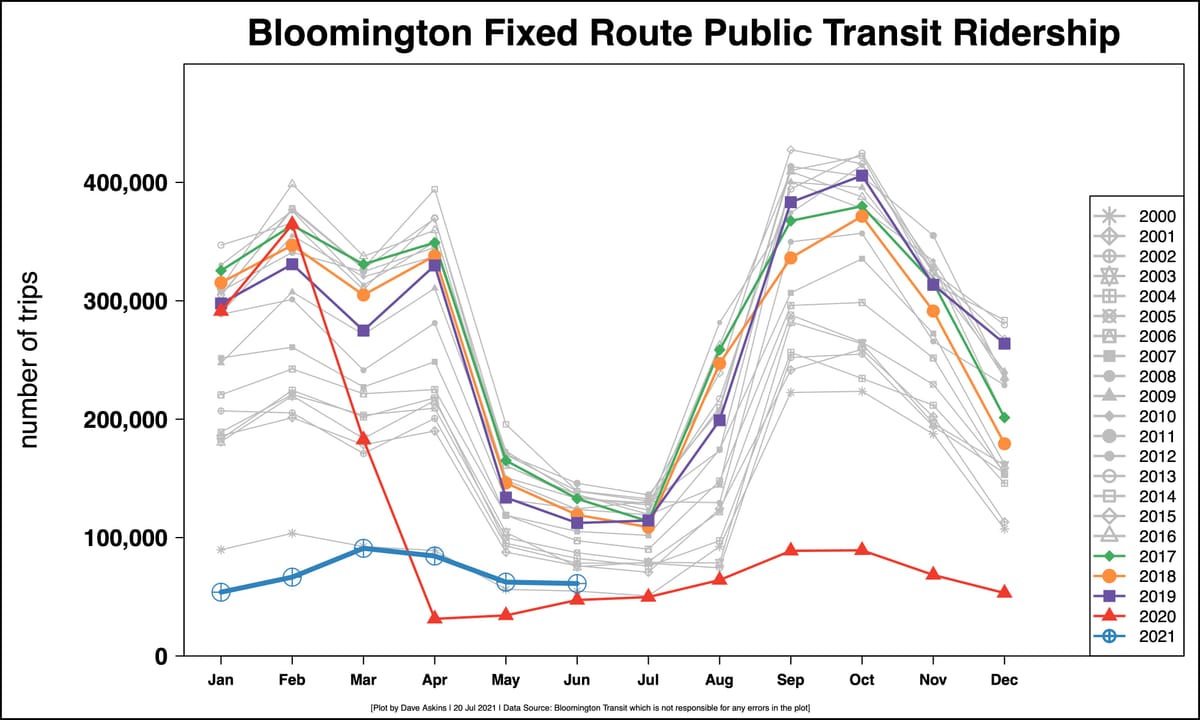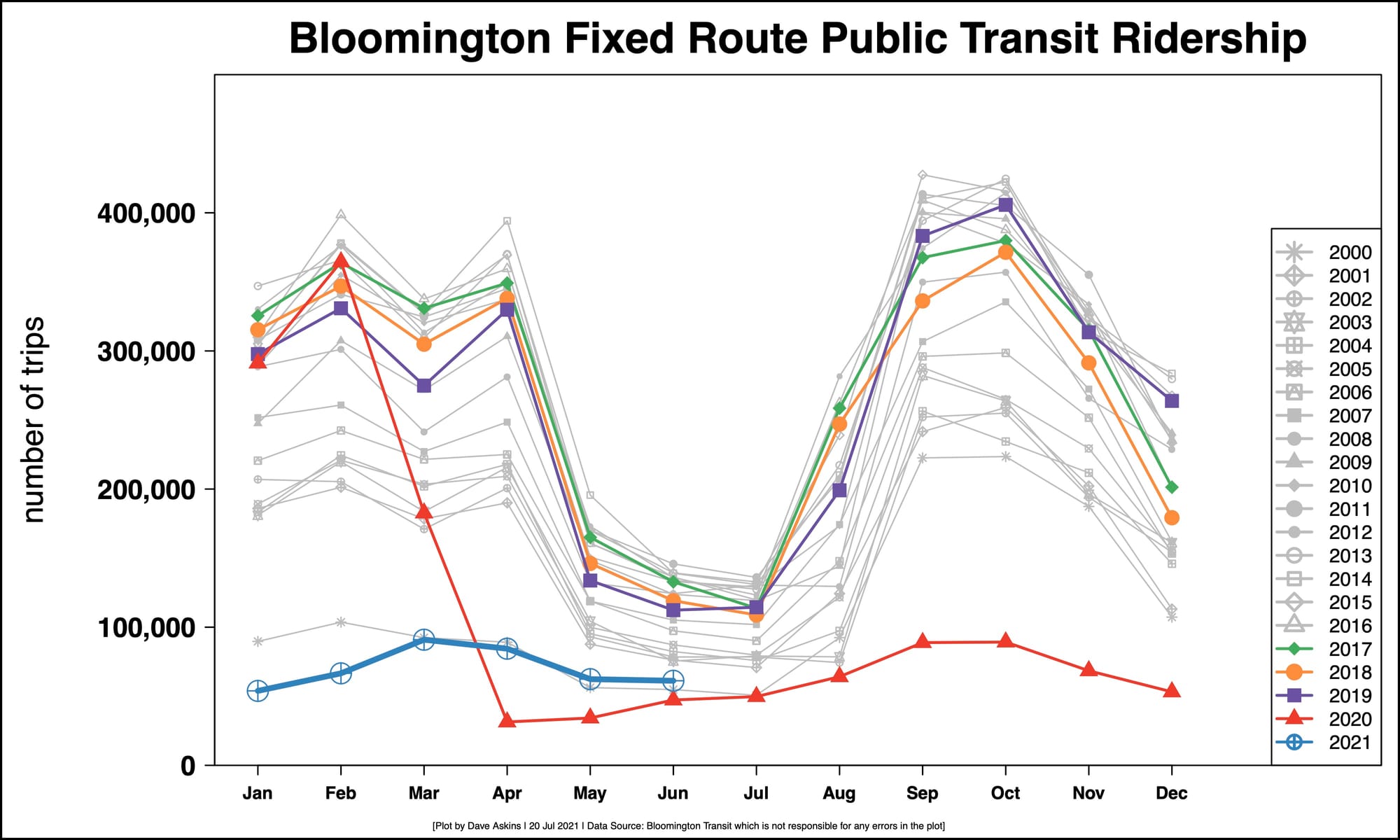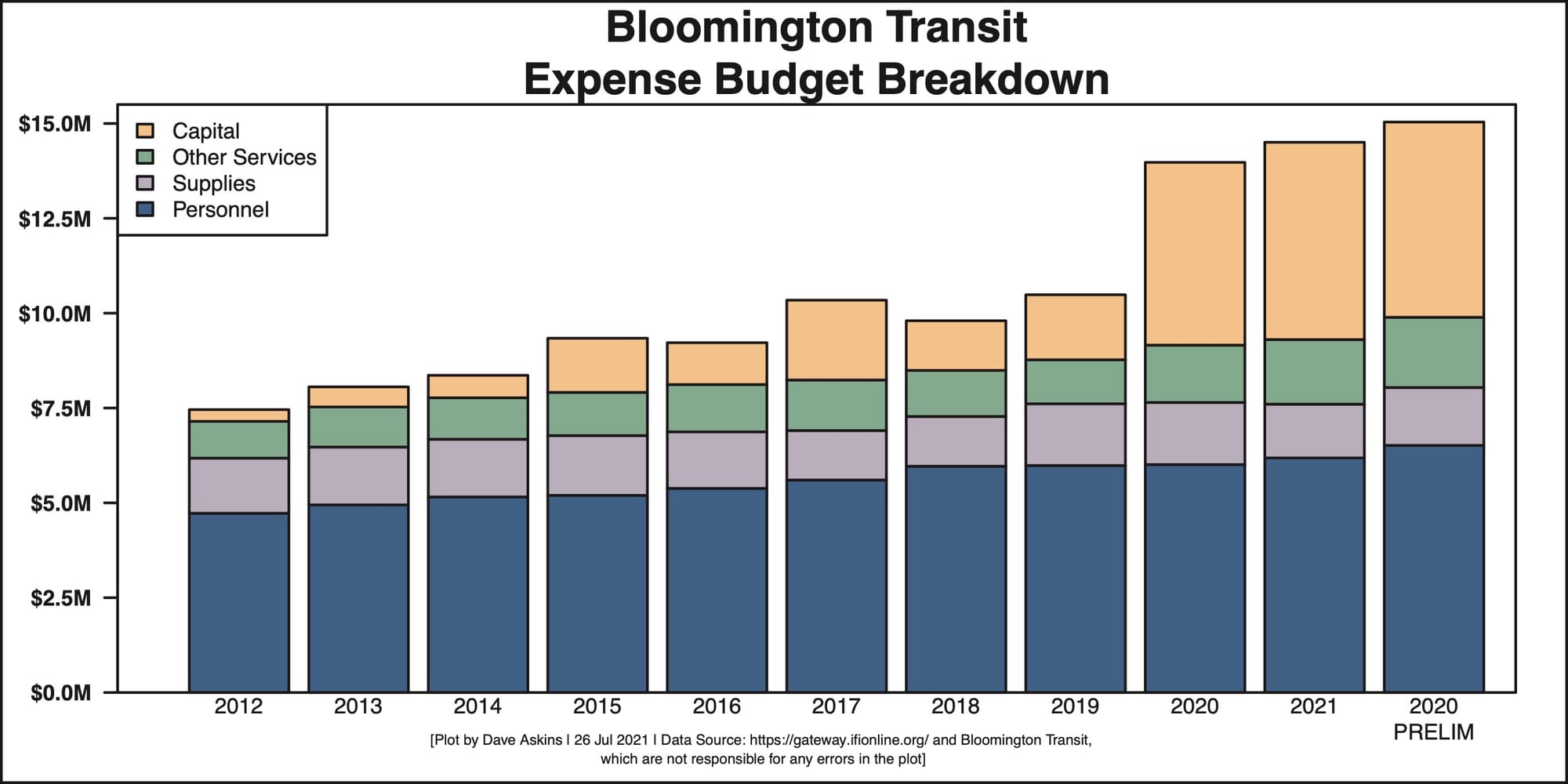Draft 2022 Bloomington Transit budget would bump pay by 3 percent, recruitment of drivers a worry



At just a smidgen over $15 million, Bloomington Transit’s preliminary budget for 2022 is about 3.7 percent more than last year’s approved total amount.
That’s the number that Bloomington Transit’s general manager Lew May presented to BT’s five-member board at its meeting last Tuesday.
Some of that increase is due to an increase in employee compensation. The preliminary budget is based on a 3-percent increase in wages. How much the increase actually turns out to be will depend on the outcome of negotiations with the drivers, who are represented by AFSCME Local 613.
Those negotiations will need to take place over the next few months, because BT’s labor agreement ends on Dec. 31, 2021.
The timing for the back-and-forth between BT and drivers will coincide broadly with BT’s transition from May’s leadership, who has served 22 years as general manager, to John Connell’s, who was the board’s pick last week to succeed May. Connell is now operations manager for the Greater Lafayette Public Transportation Corporation.
BT’s board will likely vote on the final budget at its August meeting. The budget will then be presented to Bloomington’s city council for review and approval, in a separate vote from the city’s own budget.
The collective bargaining agreement could be a factor in addressing BT’s current shortage of drivers. A June job fair attracted no new applicants to fill the 12 positions that BT is currently short.
Those positions need to be filled in order to provide the level of service that will be necessary this fall, when the Indiana University resumes a normal in-person class schedule. That’s after IU delivered much of its instruction through video-conferencing during a year and a half of the COVID-19 pandemic. That dramatically reduced travel needs, even for students who were living in town.
One of the ideas that was floated at Tuesday’s board meeting was to offer a higher step on the wage progression scale to drivers who already have a commercial driver’s license (CDL) when they’re hired. Board member Doug Horn expressed concern that just dollars and cents might not be enough: “I have heard here in these meetings that we can’t buy our way out of this problem with dollars.”
Board member James McLary said he was struck by a distinction that Connell had made when he was interviewing for the general manager job: bus driving as a profession, not as a job. That’s a perspective that seemed to resonate with McLary and other board members.
In addition to some kind of wage increase, some of the other expense items contributing to the higher budget were listed out in the staff memo included in the board’s information packet.
For example, the 2022 budget includes a new road supervisor position budgeted at $49,222 in wages. It was in that context that board member Doug Horn raised a question about another possible position—to handle information technology (IT).
Horn said he’d been hearing since he began his board service, in late 2020, that the level of IT service provided through contractual arrangement with the city of Bloomington was not adequate.
Given that there was no proposal in the budget for an additional position to handle IT, Horn said, “I don’t see the board’s concern reflected in budgetary changes.”
May’s response was to note that the presentation Tuesday night was for the preliminary budget—it was an opportunity for the board to give some feedback: “This is your chance tonight, we’re soliciting your input.”
Horn indicated to May that he’d hoped for something more in the way of a chance to affect the budget. Horn felt the board was being asked to evaluate the preliminary budget without a lot of review.
Horn added, “Generally, if you’re looking for input, we have a little bit more time. And then maybe a different venue than a public, televised meeting to have discussions about questions of concern and direction.”
Some of the expense items in the preliminary budget are less discretionary than hiring new positions. One example is fuel costs, which have gone up compared to last year. The current diesel fuel contract is priced at $1.5958 per gallon. For 2022, the preliminary budget is $2.75 per gallon for diesel and $2.50 a gallon for unleaded.
Electricity costs in the preliminary budget are projected to increase by 26.8 percent. That reflects the costs to charge the two new electric buses, for which BT has recently taken delivery. The electric buses were due to be soft-launched on routes late last week. But based on conversation with bus drivers at the downtown transit center on Monday, the new electric buses won’t see their initial service runs until next week.
The preliminary 2022 budget continues BT’s push over the last two years to replace its fleet with hybrid or all-electric buses, using federal grant awards. So there’s also $4.4 million in the preliminary 2022 budget to buy four battery-electric buses and charging stations.
Also contributing to increased expenses in next year’s budget is a January 2022 implementation of a systemwide new package of routes from a previously completed optimization study. The implementation of the optimized routes was planned for rollout in fall 2020, but was delayed due to the COVID-19 pandemic.
On the revenue side, property taxes collected by BT will increase by 4.4 percent based on this year’s maximum levy growth quotient, which was recently released by the state’s budget agency. That’s a slightly better increase in property tax revenue than last year’s 4.2 percent bump.
In terms of dollars and cents, the increase in property tax revenues is reflected in the preliminary 2022 budget at $1.472 million compared to $1.414 million last year.
BT operated for more than a year with a fare-free approach, due to the COVID-19 pandemic. Based on the trends since resumption of fare collection starting July 1, BT is projecting rebounding fares from passengers who pay to board the buses.
Budgeted for 2022 is $500,000 in revenue from fares, compared to around $600,000 collected in pre-pandemic times.
During pre-pandemic times, about 70 percent of the roughly 3.1 million annual rides on BT buses consisted of Indiana University affiliates. They don’t pay when they board the bus, because their costs to ride BT buses are supposed to be covered through a contract with IU.
The preliminary budget for 2022 includes $1.168 million in revenue from the IU contract.
The largest chunks of BT’s revenue in the 2020 preliminary budget come from state and federal assistance—at $2.6 million and $8.4 million, respectively.




Comments ()